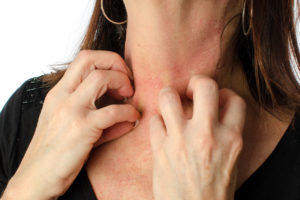If you have chronic hives, you know all about the most defining characteristic of this skin condition: the itch. Medical experts often describe the hives as “pruritic wheals,” which in plain language means itchy welts that appear on your skin.
Chronic hives (urticaria) can be very frustrating and challenging to control. Besides causing discomfort, chronic hives can interfere with daily activities, but there are many ways to manage the condition even if you don’t know its cause.
What are Chronic Hives?
Hives are a common condition affecting approximately 25% of the population at some time. Urticaria is unpredictable and results in a great deal of distress because of the intense pruritis (itching), and the interference it causes to sleep and daily life. The fundamental step in managing urticaria is to classify the nature of the condition.
Types of hives include:
- Acute Urticaria. This rash lasts less than 6 weeks and is usually brought on by an adverse or allergic reaction to certain foods or medications.
- Chronic Urticaria. These rashes last for more than 6 weeks.
- Physical Urticaria. This is due to irritation of the skin. This rash rarely spreads beyond the original location.
- Dermatographism. This condition is when hives occur due to scratching or vigorously rubbing the skin.
What are the Symptoms?
While they resemble bug bites, hives (urticaria) are different in several ways:
- Hives can appear in any area of the body; they may change shape, move around, disappear and reappear over short periods of time.
- The bumps usually appear suddenly and go away just as quickly.
- Pressing the center of a red hive makes it turn white, a process called “blanching.”
How to Manage Chronic Hives?
Regardless of the specific characteristics, most people with chronic hives just want to find an effective treatment. Finding some relief understandably becomes your first priority. Get control of your itching by looking into the available treatment options.
-
Avoid triggers
One of the best ways to control hives is to avoid known triggers. To determine which triggers may be affecting you, the first step is to see your allergist. If one or more of these allergens is found to be the cause of your hives, your allergist will work with you to figure out ways to avoid exposure.
-
Reassess Your Skincare Products
Reassess all of the products that you use on your skin: your soap, lotion, deodorant, face cream, and perfume/cologne. Learn how to read labels and identify chemicals that are known to dry out or irritate the skin, including propylene, glycol, toluene, triclosan, formaldehyde, and sodium lauryl sulfate.
-
Over-the-Counter Antihistamines
The first-line treatment for hives. These drugs work by suppressing histamine, a chemical produced by the immune system that instigates the symptoms of allergy.
-
Stay Calm
Stress can trigger hives. If you feel stressed often, healthy ways to reduce your stress include exercising daily, meditating, and practicing mindfulness.
-
Steroids
If antihistamines don’t help, your doctor might prescribe a corticosteroid. These drugs calm the immune system. That can make your hives less severe.
-
Soothe Your Skin
The drier you skin, the itchier it feels, tempting you to scratch. But scratching is one of the worst things you can do because it can aggravate your hives. To calm the itching, keep your skin moisturized. Taking frequent baths can also help reduce itching and scratching.
-
Wear Loose, Light Clothing
Constant friction and pressure on your skin can worsen your hives. Avoid wearing constricting clothing, tight belts, and even ill-fitting shoes, as hives can also occur on the soles of your feet.
-
Apply Cold Compress
You can apply a cool, damp cloth to the affected area. This can provide temporary relief from itchiness and help reduce inflammation. A cold compress can be used as often as necessary.
-
Take Vitamin D Supplement
Adding a vitamin D supplement to your treatment plan may help reduce the symptoms of chronic hives, according to a small study published in January 2014 in the Annals of Allergy, Asthma & Immunology. Talk to your doctor about possibly adding a supplement to your treatment.
Takeaway
Life with chronic hive can be frustrating, especially if your symptoms prevent you from getting enough sleep and completing daily tasks. But there are several ways you can ease the itchiness and discomfort that comes with your condition.
A board-certified allergist will give you a thorough medical exam that can help rule out possible causes, such as infection or medication which could be causing your hives. They also recommend lifestyle changes and prescribe medication that can help reduce your flare-ups.
To make an appointment today with Dr. Amy Schiffman, call her at 561-409-2800.

